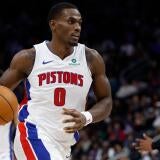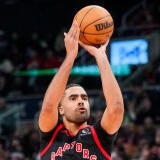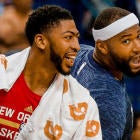Pelicans preview: DeMarcus Cousins-Anthony Davis experiment on short leash
New Orleans has limited time to see how Davis and Cousins mesh before facing a big decision

While the rest of the league was zigging, the New Orleans Pelicans decided to zag. As the league continued to steer toward smaller, positionless basketball, the Pelicans traded a modest package to the Sacramento Kings in the hours following February's All-Star Game to acquire DeMarcus Cousins, another near-7-foot supertalent to place alongside All-NBA forward Anthony Davis.
Going with the "twin towers" lineup may seem counter-intuitive to the modern NBA, but it's not like New Orleans is pairing Andre Drummond with DeAndre Jordan -- Cousins and Davis aren't your traditional big men. In fact, they're about as "new breed" as you can get, both with the ability to make 3-pointers, hand the ball and guard smaller players when necessary.
The problem is, it didn't seem to work last season. Granted the sample size is microscopic (17 games, 394 minutes on the court together), but the Cousins-Davis combo went 7-10, a far cry from the playoff run some expected New Orleans to make following the trade.
What the Pelicans really need is time -- time for Cousins and Davis to jell, time for Jrue Holiday to adapt to playing off the ball next to Rajon Rondo, time for the Pelicans to slowly acquire pieces to go around their stars.
Time, however, is the one thing that the Pelicans just don't have.
The Boogie problem
Every sentence about DeMarcus "Boogie" Cousins starts the same way: He's undoubtedly one of the most talented players in the league, but ...
What follows the "but" is usually something about his attitude, his defense, his conditioning or the way he seemed to consistently alienate his teammates and undermine his coaches in Sacramento. That's a tough mixture of problems to bring to a young team with a young leader looking for an identity, and the Pelicans found that out last season.
That being said, the trade was the right thing to do. The only potentially viable part of the Pelicans' future that they gave up in the trade was Buddy Hield. The other pieces (Langston Galloway, Tyreke Evans, the 2017 first-rounder that turned out to be No. 10 and the second-rounder that ended up No. 34) were really of no use to a team looking to get moving in the winning direction before Anthony Davis has a chance to bolt after the 2021 season.
The experiment of putting two of the league's best centers on the same team was certainly one worth trying, particularly in a league where size is becoming undervalued due to a proliferation of smallball lineups and 3-point shooting.
But there's one gigantic, pressing issue: Cousins' contract expires at the end of this season.
So the Pelicans only have a short amount of time to assess whether or not the Cousins-Davis frontcourt is going to work -- definitely not as much time as they'd like. Unless the Pelicans are miraculously in the top five in the Western Conference by the time Feb. 8 rolls around (this season's trade deadline is nearly 20 days earlier than last year's) or they've received a long-term commitment from Cousins, the Pelicans will have to seriously consider trading him, even if his production is at an all-time high.
Cousins could easily fetch a solid haul of established talent and future picks under normal circumstances. But we saw this summer with Jimmy Butler and Paul George how difficult it is to get equal value for a star when your leverage is gone. With that in mind, waiting until the trade deadline is a gamble. You could find a desperate team trying to make some noise, or you could be met with a market full of teams unwilling to mortgage their future just to end up losing to the Cavs or Warriors.
It's not going to be an easy decision for the Pelicans, but they'll have to decide by December or January whether Cousins is going to be a part of their plans moving forward.
Will Cousins do more harm than good in New Orleans?
Here's a quick point-counterpoint on Cousins, one of the most polarizing players in the NBA:
Point: Cousins caused locker room issues in Sacramento and had trouble getting along with teammates.
Counterpoint: He never played on a Kings team that finished with more than 33 wins, and losing is frustrating for a competitive player who's clearly head and shoulders above his teammates talent-wise.
Point: Cousins has undermined his coaches and occasionally tried to get them fired.
Counterpoint: He played for seven different coaches in seven seasons in Sacramento, making it impossible to develop or maintain chemistry. Also, the one coach he reportedly loved and respected, Mike Malone, was fired 24 games into his second season with the team.
Point: If Cousins is a franchise-level talent, how could he not lead the Kings to the playoffs even once in seven seasons?
Counterpoint: During his tenure, the Kings were unarguably the worst front office in the NBA. Cousins had a limited supporting cast due to horrific draft picks (Thomas Robinson, Jimmer Fredette, Ben McLemore, Nik Stauskas) and the Kings allowed Isaiah Thomas to walk away from the team for a measly $7 million per year.
So is Cousins a product of a toxic environment or a troubled locker room cancer who will never be able to win in the NBA? We don't know the answer, but we do know this: His situation in New Orleans isn't much better than it was in Sacramento.
Other than Davis, the absolute consensus "we're not even looking at other names" top pick in 2012, New Orleans hasn't developed a single impact player through the draft. They also haven't been able to secure any long-term talent through free agency. As a result, general manager Dale Demps has been on the hot seat for what seems like years.
As for the security of the head coach, Alvin Gentry's status is about as unstable as a radioactive isotope. He was reportedly in danger of being fired last March after the Cousins trade failed to immediately lead the team to more wins. Then over the summer, Gentry and Demps received about the worst vote of confidence you can get from executive vice president of basketball operations Mickey Loomis:
"After careful and thorough review of basketball operations, we have made the determination that the best course of action as we move forward into the 2017-18 season is to continue under the leadership of General Manager Dell Demps and Head Coach Alvin Gentry," said Loomis. "We will continue to evaluate important roles on both the administrative and coaching staffs which will be resolved at the appropriate time."
They basically told Gentry and Demps that they're not going to be fired ... until they find someone better. It's safe to say that Gentry and Demps have their resumes updated and ready to send out.
And as for the roster -- yes, Cousins has Davis -- a talent light years ahead of anyone he played alongside in Sacramento. But even assuming the two of them can successfully coexist, what else do the Pelicans have? Upon closer examination, not much.
The weird Pelicans roster
New Orleans gave Holiday a monster five-year, $132 million contract this offseason, but they really had no choice. He was going to get strong offers from other teams, and the Pels had limited options to replace him. Holiday at point guard and a Cousins-Davis frontcourt isn't a bad start for a team that's desperately trying to get into the playoffs.
But then they went out and signed Rondo to be the starting point guard. Hmmm.
"I like Jrue off the ball to start the game as a scorer. I like Rondo being on the floor as a leader," Gentry said this summer. "Obviously, Jrue's going to play some where he's the primary ball handler. I spoke to Jrue at length about this and I think it's something that can really help our team."
In theory this makes sense, but a closer look at the numbers should make you a little more skeptical. Holiday averaged 15.4 points last season and shot a respectable 36 percent on 3-pointers, but that number dropped to 30.4 percent on catch-and-shoot 3s, as opposed to 37.6 percent on pull-up 3s. In his role as a shooting guard, he'll have to take a lot more 3-pointers, particularly of the catch-and-shoot variety from post kick-outs from Davis and Cousins and off of Rondo's penetration. If he's unable to knock those down, Holiday's talents are being wasted off the ball.
Having Rondo on the floor also creates its own problems. For starters, Rondo was nearly out of the league last year, relegated to the Bulls' third point guard, before an explosion in the playoffs brought him back onto the national radar. He's improved his 3-point percentage in recent years, shooting 38 percent on 133 attempts last season, but he will never be a floor spacer. Defenses will continue to sag off of him, knowing that he'll stop shooting after a miss or two.
Assuming that Boogie and The Brow are most effective playing high-low, with one at the top of the key and one posting up down low, the Pelicans desperately need space for them to operate. Rondo's man will be free to roam and help out on either big as necessary, and will also be willing to leave Rondo to help on rotations to other shooters. The fear with Rondo out there is that either Davis and Cousins, both proficient 3-point shooters, will be forced to drift to the 3-point line to make room for Rondo's penetration. This will create a dangerous incentive for Cousins and Davis to consistently stay farther away from the basket, which their opponents will gladly take.
So the announcement that Rondo will miss 4-to-6 weeks after sports hernia surgery may actually be a blessing in disguise for the Pelicans. By returning Holiday to his natural point guard position and starting E'Twaun Moore (37 percent on 3s last season) at the two with Dante Cunningham (39 percent) at the three, you create the necessary space for Davis and Cousins to go to work. Ian Clark, an offseason signing who shot 37 percent on 3s for the Warriors last season, is another player who will fit nicely into this gameplan either as a backup point guard or playing alongside Holiday at the two.
Perhaps playing the first month or so without Rondo will convince Gentry that starting him isn't the best course of action. But Gentry might just be convinced that the Rondo-Holiday combo will work, in which case he'll throw Rondo right into the starting lineup once he's healthy.
Depth and defense
In addition to their confusing lineups, the team is also extremely thin on bench talent. Cheick Diallo supposedly took some strides this summer, so the Pelicans are hoping he can fill in as a serviceable back-up big when necessary. Solomon Hill missing six-to-eight months with a torn hamstring is a huge blow to the team, as his minutes will have to be filled by some combination of Darius Miller, Jordan Crawford, newly acquired Grindfather Tony Allen and 19-year-old rookie Frank Jackson out of Duke. Last year the Pelicans wisely staggered Davis and Cousins so that at least one was on the floor basically at all times. They'll have to continue that, and hope that they can keep the bench unit afloat offensively.
Defensively, the Pelicans were surprisingly competent last season. They were ninth in the NBA with a defensive rating of 104.9, and staying around that number would be a victory this season. Allen and Clark should help defend the perimeter, and Diallo and Alex Ajinca can help protect the rim while Cousins and Davis are resting. Oh yeah, Omer Asik and his $11 million salary are also lurking somewhere around New Orleans.
So, what's a success for the Pelicans?
The Pelicans want to make the playoffs, as they've continued to state. But what good does the eighth seed really do if you lose Cousins at season's end? In a gauntlet of a Western Conference, the real success for the Pelicans this season will be measured by how well they've set themselves and Davis up for the future. If that means locking up Cousins, so be it. If that means trading Cousins for established talent and picks, then that's the right move.
If they can finish .500 or better that's icing on the Baby Cake, but this season is all about keeping Davis happy and convincing him that the team is moving in the right direction. Otherwise they could be looking at losing one of the most versatile big men the league has seen -- either when his contract is up in 2021 or even earlier through a trade demand.
No pressure, Pels.

















